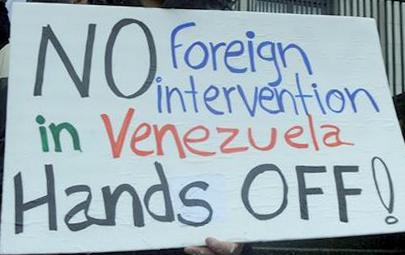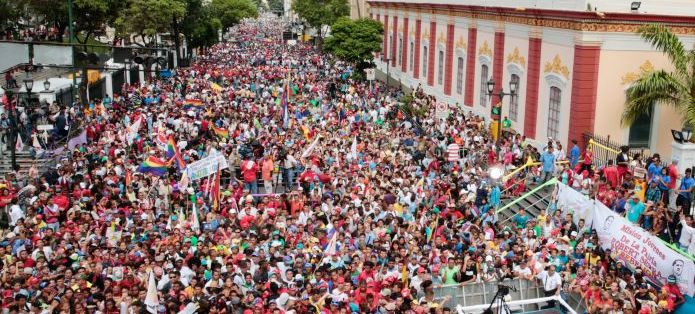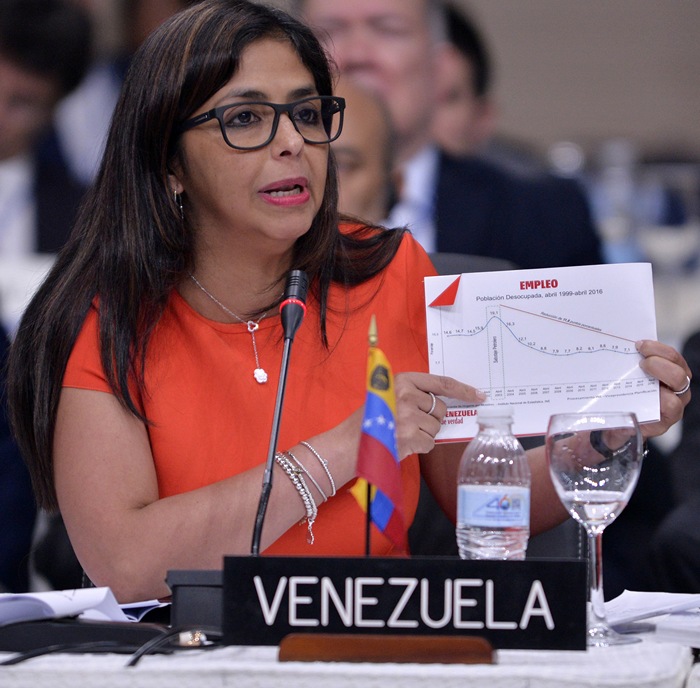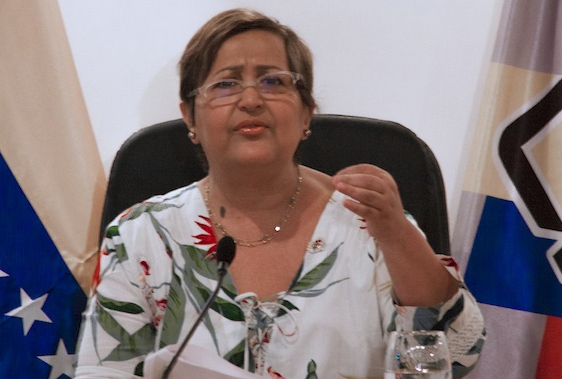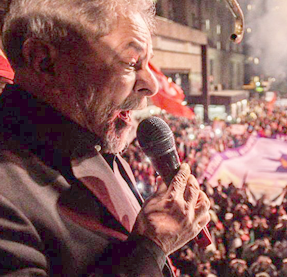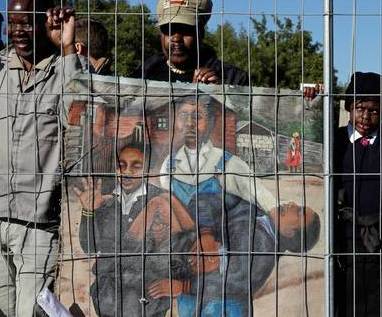
|
June 18, 2016 - No. 25 Update on Latin America and the Caribbean Calls for
Strengthening Strategies to Confront Imperialist Intervention
Venezuela Update on Latin America and the Caribbean Calls for Strengthening Strategies to Confront Imperialist Intervention in the Region
The Political Council of the Bolivarian Alliance for the Peoples of Our America-Peoples Trade Agreement (ALBA-TCP) met in Caracas, Venezuela on June 8 to discuss strategies to confront imperialist intervention and coup plots in the region, the Venezuelan state news agency (AVN) reported. Two immediate cases are those of Venezuela, which has been subjected to an attempt by the Organization of American States (OAS) to justify intervention via the application of the bloc's Inter-American Charter, as well as Brazil, where a parliamentary coup and media campaign are currently underway against the country's legitimate President, Dilma Rousseff. In his comments during Council meeting, Cuba's Foreign Minister Bruno Rodríguez Parrilla emphasized the timeliness of ALBA's mobilization given the escalating right-wing offensive taking place across the region. He stressed that in these circumstances, it is the ALBA-TCP Political Council's responsibility to mobilize popular and political movements, revolutionary and progressive forces, trade unions, campesinos and intellectuals to confront imperialist intervention, coups, and neo-liberalism. He also called on social movements to defend progressive governments facing attacks orchestrated by foreign powers. As reported by AVN, Rodriguez explained that to do so, the unity and gains achieved by the region in international organizations such as the Union of South American Nations (UNASUR) and the Caribbean Community (CARICOM) must be consolidated. "Latin America and the Caribbean have changed, we are no longer, nor will we be, the backyard of the United States. We will not allow for the return of the carrot and the stick and I repeat that no one can beguile Cuba, which is still under blockade and whose territory in Guantánamo is still occupied, while attempts are made to isolate Venezuela," he stressed. In this regard, he added that the region is at present threatened by the U.S. government and national oligarchies, who, for lack of popular support, "again resort to coups to reverse sovereignty over our natural resources, our policies of independence and social development." During his speech to the Council, Rodríguez noted that the region's history will be defined in the current battle of Venezuela against constant threats, and reaffirmed Cuba's solidarity and the deep bonds between the two nations. "The history of Latin America and the Caribbean is being decided in this battle. Here in Venezuela, we will all defend -- whatever the price -- the legacy of [Hugo] Chávez and Venezuela will continue to have in Cuba a sister nation ready to share the same fate," he said. Saint Kitts and Nevis Senior Foreign Service Officer Samuel Berridge also stated his country's support for the Bolivarian Republic and highlighted the progress made during the past 17 years, thanks to agreements such as Petrocaribe and the services provided to the peoples through different social missions. "We are encouraged by the model of social cohesion in Venezuela," Berridge stated, while expressing support for dialogue initiatives promoted by the national government, with UNASUR support. "Saint Kitts and Nevis is supportive of the government and people of Venezuela and is committed to ensuring the onset of a new era of economic growth and development in Venezuela. Venezuela is an important member in our hemisphere. The country is of no interest to us weakened and will be of no benefit to ALBA or the rest of the hemisphere," he emphasized. Foreign Minister of the Bolivarian Republic of Venezuela Delcy Rodríguez condemned the media campaigns against leftist governments in the region, which seek to set the stage for imperialist aggression. "The peoples do not want to go back to the dark decade of neo-liberalism. They do not want to be politically, economically, financially suppressed and subjugated and handed over to the International Monetary Fund," she said. According to Venezuelan President Nicolás Maduro, the main topic of discussion at the meeting was the need to create a common strategy for the defence and freedom of the revolutionary processes. Ecuador's Foreign Minister Guillaume Long highlighted that the union of the ALBA-TCP countries is necessary to address and counter the effects of the global right in their attacks against the region. Minister of the Presidency of Bolivia Juan Ramón Quintana on behalf of his country also condemned any attack against Venezuelan democracy. ALBA's Special Declaration Supporting Democratic
|
|
|
The Organization of American States (OAS) held its 46th Ordinary Assembly in Santo Domingo, Dominican Republic from June 13 to 15. One of the main points of discussion was the situation in Venezuela. A decision was taken on June 15 to assess whether OAS Secretary General Luis Almagro's invocation of the Democratic Charter against Venezuela was legitimate.
Venezuelan Foreign Minister Delcy Rodríguez
denounced Almagro for questioning Venezuelan democracy and accused him
of being in the service of the U.S. to foment a coup, calling his
conduct "illegal and fraudulent." She submitted a resolution requesting
an evaluation of Secretary General Almagro's action, a proposal that
was approved by the Assembly -- by a vote of 19 in favour to 12 against
with one abstention and two absences -- for further discussion in an
OAS Permanent Council meeting in Washington, DC on June 21.
Remarking on this outcome, Rodriguez said, "This is a
historic decision [which has been] taken today. Nineteen votes in favor
says a lot about how countries have matured and moved forward, and
ratified their sovereignty and independence. [...]
"[This vote has] institutionally strengthened the organization ... We
are setting a new course in the organization ... We are making a new
path in our region [... This is] a direct message for the Secretary
General to channel his behavior in accordance with the rules and
principles that are fundamental pillars of the organization."
On June 23, a special session requested by Almagro will further address
the situation in Venezuela.
The OAS Permanent Council voted against suspending
Venezuela, opting instead to take a path of dialogue, not intervention.
In a statement issued at the end of the Assembly, OAS member states
expressed their overwhelming support for dialogue between the
Venezuelan government and the opposition and rejected a move toward
sanctions against the country.
(AVN, TeleSUR. Photo: J.M. Herrera.)
U.S. Recognizes Maduro Government's Call for Dialogue and Agrees to High-Level Talks
The U.S. government has agreed to recognize the process of dialogue with the opposition initiated by the Maduro government to overcome Venezuela's economic situation. This process already has the support of the Union of South American Nations (UNASUR) and former presidents José Luis Rodríguez Zapatero of Spain, Leonel Fernández of the Dominican Republic and Martín Torrijos of Panama.
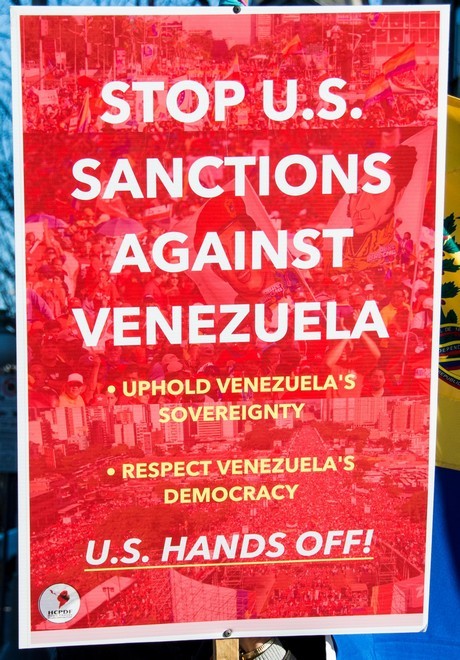 In a June 14 meeting with
Venezuela's Foreign Minister
Delcy Rodríguez on the sidelines of the 46th regular session of
the OAS
General Assembly in the Dominican Republic, U.S. Secretary of
State John Kerry said that the U.S. supports the process of
dialogue led by President Nicolás Maduro with all sectors of the
country. However, also on June 14, Kerry spread all manner of
disinformation about the Maduro government in Venezuela, trying
to blame it for the conditions facing the people, while covering
up U.S. interference and attempts at regime change that underlie
the present situation. He made it clear that the U.S. backs the
reactionary opposition's demand for a recall referendum to remove
President Maduro from office.
In a June 14 meeting with
Venezuela's Foreign Minister
Delcy Rodríguez on the sidelines of the 46th regular session of
the OAS
General Assembly in the Dominican Republic, U.S. Secretary of
State John Kerry said that the U.S. supports the process of
dialogue led by President Nicolás Maduro with all sectors of the
country. However, also on June 14, Kerry spread all manner of
disinformation about the Maduro government in Venezuela, trying
to blame it for the conditions facing the people, while covering
up U.S. interference and attempts at regime change that underlie
the present situation. He made it clear that the U.S. backs the
reactionary opposition's demand for a recall referendum to remove
President Maduro from office.
Regarding relations between Venezuela and the U.S., Venezuela has repeatedly called on the government of Barack Obama to advance a bilateral relationship based on respect for sovereignty and in accordance with the principles and purposes of the United Nations Charter.
Kerry said the U.S. is willing to improve bilateral relations with Venezuela, claiming that the goal is to go "beyond the old rhetoric." As a first step, he announced that U.S. diplomat Thomas Shannon will be sent to Venezuela to help promote a new stage in relations between the two countries. Shannon's credentials appear to be involvement with other U.S.-backed coups in the region. U.S. economist Marc Weisbrot, speaking to RT.com in a May 14 interview about the coup in Brazil, stated that Shannon "has been involved in helping other coups in the region, including Honduras in 2009 -- the military coup -- was very much involved in helping that coup succeed. He was also involved in the aftermath of the Paraguay coup in 2012, which is very much like this one [in Brazil ...].
"Thomas Shannon is a person who is going to recommend to the government what to do. He is the number three person in the U.S. State Department, and is a former Brazilian ambassador. He is definitely going to be deciding. He met with this leader of the impeachment process or the coup, and he didn't have to do that. He could have said he was busy, anything. So, by meeting with him right in the midst of Dilma [Rousseff]'s impeachment, I think that was a way of showing everybody who is paying close attention that the U.S. basically supports the coup. They are not going to say anything or do anything more than that, because they want to create the appearance of neutrality."
President Maduro on June 14 said that Venezuela accepts this new phase of dialogue that includes high-level meetings with the United States. "Let's start these high-level meetings. I do agree," Maduro stressed in Caracas at the Miraflores presidential palace, adding "We know how to defend our truth through words, examples, peace diplomacy, the Bolivarian peace diplomacy, and that's the way the meeting [today] was held. It was a friendly meeting."
(AVN, RT.com, OAS)
Opposition Carries Out Recall Process on the
Basis of
Blackmail and Fraud
On June 10, the President of Venezuela's National
Electoral Council (CNE), Tibisay
Lucena, warned that the recall process against President Nicolás
Maduro
will
be
immediately
suspended
in
the
event
of
any
further
violence
against
the
CNE.
The
reactionary
opposition
forces
in
Venezuela,
which
have
been
using
violent
blackmail
and fraud aimed at
removing the democratically-elected President of Venezuela, attempted
to
storm CNE headquarters in Caracas on June 9.
|
|
On May 23, the Supreme Court granted a protection order for the CNE headquarters and offices across the country at the request of CNE workers following opposition-led violence in Caracas.
The CNE is mandated to validate the 1.85 million signatures submitted by the opposition on May 2 and is methodically carrying out its work. It has rejected pressure from the opposition and accusations that it is stalling, saying that the validation of the signatures is a "clearly established process" that must be completed before a referendum can proceed and a timetable be announced.
The opposition forces are eager to see a referendum take place in 2016 as, if a referendum removes President Maduro within the year a presidential election will be triggered. If a referendum removes Maduro after January 10, 2017, the four-year mark of his term, Vice-President Aristóbulo Istúriz will serve out the remaining two years of the term until the next election in 2019.
Maduro himself pointed out that infighting amongst the opposition forces led to delays in initiating the recall process and expressed confidence that the Bolivarian forces will prevail. The process for a recall referendum against former President Hugo Chávez took eight months.
Indications of Massive Fraud
The CNE reported on June 10 that of the signatures submitted for the recall referendum, 605,000 were invalid and have been disqualified. Of these, 307,747 lacked essential information, such as a name, fingerprint, signature, or the name and office of the person being recalled. A further 53,658 signatures presented other irregularities, including 10,995 dead persons, 9,333 nonexistent persons, 3,003 minors and 1,335 felons.
Jorge Rodríguez, a United Socialist Party of Venezuela (PSUV) representative and mayor of the Libertador district in Caracas, demanded the opening of an investigation into the alleged massive signature fraud.
CNE President Lucena explained that the next stage in the process is to confirm the identities of the remaining signatories. Citizens who wish to contest the invalidation of their signatures had from June 13 to 17 to do so. Those whose signatures have been validated have from June 20 to 24 to have their fingerprints double-checked by electoral authorities.
After that, the CNE will have 20 working days to determine whether the opposition petition qualifies for the next stage of the recall process, which consists of collecting signatures from 20 per cent of registered voters. In the 2015 National Assembly election, approximately 19.5 million Venezuelans were registered to vote, meaning that nearly 4 million signatures would be required to advance the recall process to the next stage.
(Prensa Latina, venezuelanalysis.com, TeleSUR. Photo: CNE)
Brazil
First Month of Coup Government Met
with Mass Protests
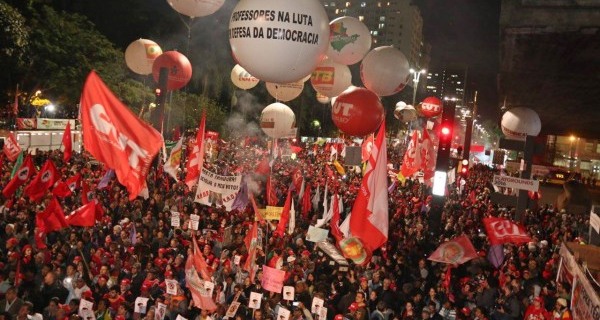
São Paulo, June 10, 2016
Massive protests in defence of democracy and opposing the corrupt impeachment process against President Rousseff took place in almost all states throughout Brazil on the evening of June 10. Hundreds of thousands of supporters of President Rousseff gathered in advance of the first month of the illegitimate coup government of Michel Temer. On May 12 despite total lack of evidence or criminal accusations against her, Brazil's senate voted to proceed with impeachment against President Rousseff, leading to her suspension from office and replacement by Vice President Michel Temer.
|
|
Former President Luiz Inacio "Lula" da Silva, Rousseff's predecessor and political mentor, participated in the protest held in São Paulo, which also gathered student associations, trade unions, and other social movements. According to organizers, 100,000 people attended the protest.
"The most important thing for the social movements gathered here is stopping the impeachment, stopping the coup," said Vagner Freitas, head of Brazil's largest trade union CUT.
Attendance reached 20,000 people in Rio, organizers said, where prominent local politicians participated in the protest and citizens called for Rousseff's return to office. Other large protests occurred in major cities such as Belo Horizonte, Brasília and Recife.
In a June 15 television interview, Rousseff said that if she manages to return to office, she will consult the population about the path national politics should take. That declaration may win Rousseff the support of more senators in the final vote to approve the impeachment process, which is expected to take place in August, according to analysts.
Rousseff has been travelling across the country to meet with local leaders and participate in political rallies, where she always receives a warm welcome.
The first month of Temer's government has been marked
by
increasing scandals as the self-serving actions and corruption of the
forces behind the coup are more and
more exposed.
Mass Actions on June 10
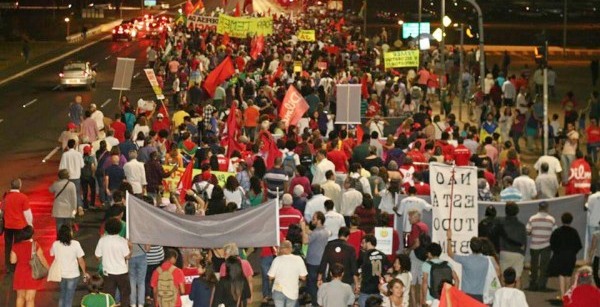
Brasília
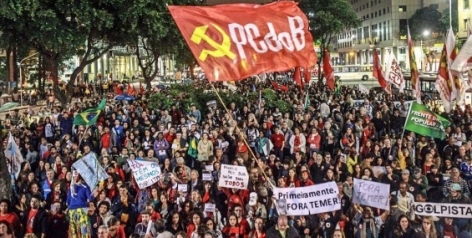
Rio de Janeiro
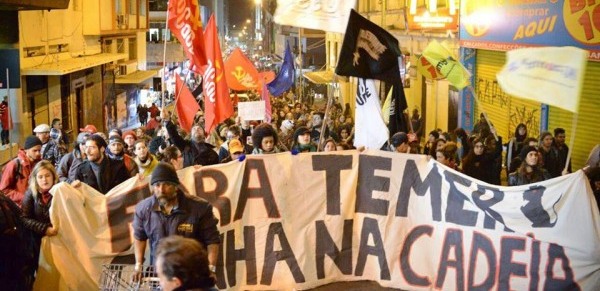
Porto Alegre
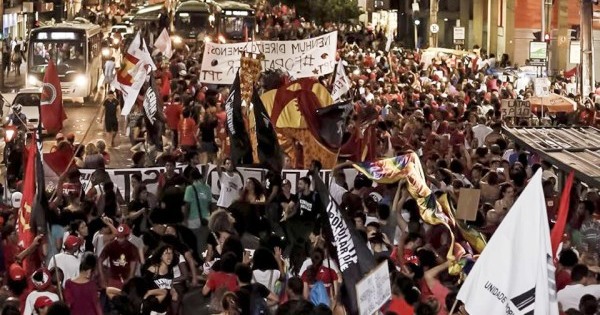
Recife
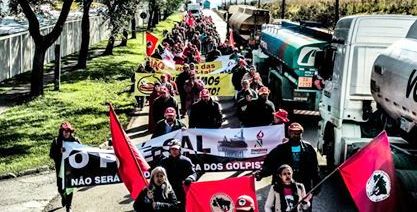
Paraná -- contingent of refinery workers.
(Xinhua. Photos: Vermelho, V. Borba, B. Bou.)
Coup Leader Facing Expulsion from Congress Threatens to Take Down Other Corrupt Politicians
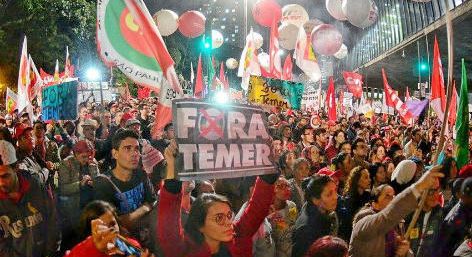
São Paulo, June 10, 2016
The Council of Ethics of Brazil's Chamber of Deputies on June 14 voted 11 to 9 to suspend Eduardo Cunha from his seat in the Chamber and ban him from elected office for eight years for lying about his undeclared Swiss bank accounts. Cunha was one of the main instigators of the parliamentary coup against President Dilma Rousseff which, amongst other things, was intended to divert attention from the corruption of the coup plotters themselves. The Supreme Court had already suspended Cunha from his position as speaker of Brazil's lower house on May 5 over allegations he was using his position to obstruct an investigation into possible improprieties.
The June 14 vote by the Council of Ethics concerned an alleged U.S.$5 million in bribes hidden away in a Swiss bank account. Despite Cunha's denials, accounts tied to him were repeatedly confirmed by Swiss officials.
Now, if Cunha loses a vote on the matter in the lower house -- that is, if at least 257 of the 513 lawmakers vote to suspend him -- he will lose his seat. However, Cunha can seek relief from the Constitution and Justice Committee of the chamber before the vote in the House plenary is held.
The process in the Council of Ethics began in October 2015 and the vote followed months of stalling tactics by Cunha, making it the longest such process in the body's history.
Cunha has now begun to threaten his former allies, including the coup-installed president Michel Temer. He says that none of Temer's projects will pass in the lower chamber without his support. On June 15 he stated that if expelled, he will bring down 150 parliamentarians, as well as a minister and a senator close to the illegitimate president.
(TeleSUR. Photo: Vermelho)
Ecuador
Government Confirms CIA Attempts
at Destabilization
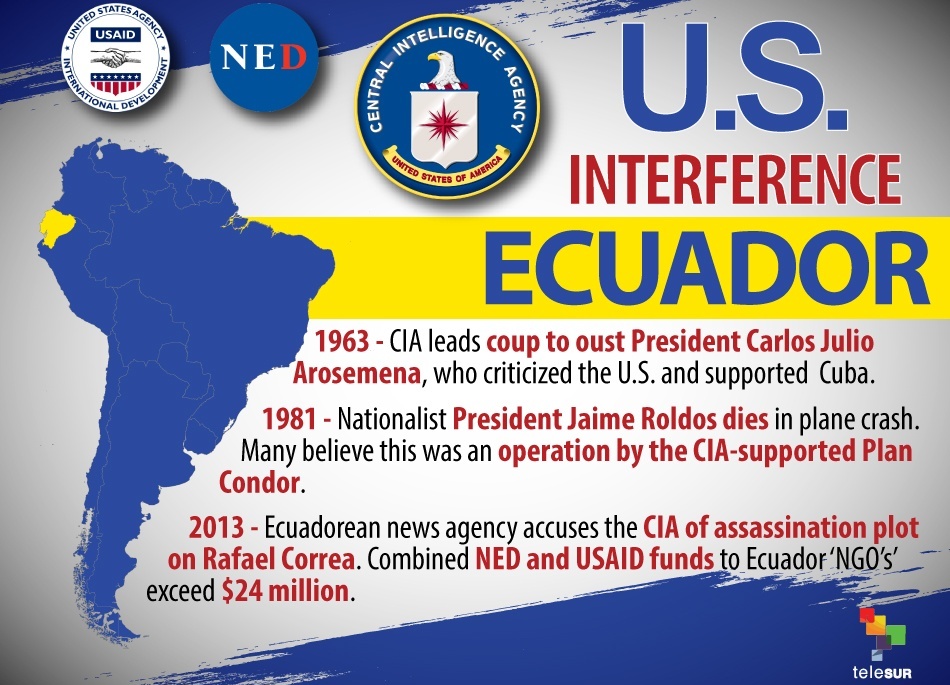
Ecuadorean President Rafael Correa at a June 8 press conference confirmed U.S. Central Intelligence Agency (CIA) involvement with that country's journalists, media and politicians to destabilize his government through smear campaigns, which has been backed up by an investigation by TeleSUR.
"The National Endowment for Democracy is the CIA's financial branch -- like in Venezuela, in Bolivia. It does not fund the Red Cross anymore, it funds groups providing training on democracy. This means, destabilizing the government and other opposition movements," said Correa.
He said his government knew of the CIA's involvement in the country: which opposition groups received funds and the strategies they used such as social networks, web pages, alleged political analysts and researchers, who cause outrage.
This is "an organized action to discredit and, if possible, to destabilize" the government, Correa explained.
|
|
Correa recalled that in 2008 the Ecuador government expelled a CIA agent known as Suad, who used to sell carpets in northern Quito. Even police commanders, politicians and journalists visited him in order to ask for instructions.
The head of state said that after the bombings in Angostura in 2008 by the Colombian military, they found that the country's intelligence services had been co-opted by foreign embassies.
He pointed out that even the appointments of authorities for the Police Special Investigation Unit depended on the U.S. Embassy at that time.
According to a report from a special commission, Manuel
Silva, former director of the Office of Special Investigations
(UIES), allegedly handed hard drives to the U.S. Embassy in
Ecuador after the 2008 bombings.
Since then, the Ecuadorean government has created a National Secretariat of Intelligence with modern equipment, in order to ensure better coordination.
TeleSUR's investigation showed how the CIA, through the U.S. Agency for International Development and the National Endowment for Democracy, gave economic resources to opposition forces to destabilize progressive governments in the region with the aim of keeping geopolitical control under the thumb of big U.S. companies.
The audiovisual material by TeleSUR demonstrated the role of several Ecuadorean and foreign politicians in the CIA's destabilization plans, including the former intelligence director of the armed forces, Mario Pazmiño; oil trade unionist Fernando Villavicencio, who was convicted of libel against President Correa; and SWAT agent Leyla Hadad Perez, a Lebanese citizen who was operating undercover in the country relaying U.S. orders to politicians in Ecuador.
Among the allies of the U.S. strategy are journalists Emilio Palacio (who sought asylum in the United States), Juan Carlos Calderon, Christian Zurita, Carlos Vera, Martin Pallares and Cesar Ricaurte, who have been given funds to comply with U.S. aims.
Digital media that includes PlanV, Focus, Crudo Ecuador and 4Pelagatos -- financed by U.S. offices for the alleged development of democracy, human rights and freedom of speech -- are part of this network.
TeleSUR also revealed suspicious meetings between CIA
agents and Ecuadorean politicians such as Gustavo and Marcelo Larrea;
Marta
Roldos' relationship with U.S. agencies seeking finance for
projects; the constant organization of violent demonstrations by
Andres Paez, and other U.S. activities.
For More Than 50 Years CIA Went
Deep into Ecuadorean
Society
- TeleSUR Report -
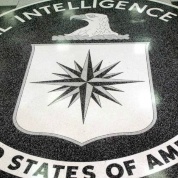 The U.S. Central Intelligence
Agency (CIA), according
to
declassified documents and testimonies of previous agency
officials, had a permanent operation to intervene in political
and social decisions of Ecuador.
The U.S. Central Intelligence
Agency (CIA), according
to
declassified documents and testimonies of previous agency
officials, had a permanent operation to intervene in political
and social decisions of Ecuador.
Starting from the sixties, the CIA infiltrated governments, police, civilian groups, and NGOs to advance U.S. interests in the country, and continues to fight for its power and influence in the region.
Unfortunately, few have knowledge of the political moves that led to the intervention of foreign intelligence forces and the deadly consequences it had for South and Central America, as well as the impact on the new world order.
Background
The Cuban Revolution succeeded in 1959 and anti-colonial resistance groups began to flourish in Latin America. The Soviet Union maintained its geopolitical strength in part through supporting its new ally, Cuba. It was the beginning of another Cold War for the U.S.
In the early 1960s, nationalist Ecuadorean President José María Velasco Ibarra and later his successor, Vice President Carlos Julio Arosemena Monroy, were pressured by the agency to break diplomatic relations with the new socialist government of Fidel Castro in Cuba. When both refused to isolate Castro's government, both were successively ousted by the country's military forces, backed by CIA operations.
Ecuador, like other South American countries, was part of the U.S.-backed Operation Condor in the 1970s. This plan endorsed state-sponsored terror to control what was perceived to be the threat of communism and eliminate subversive sectors of society.
Operation Condor's targets were activists, organizers, and opponents of the dictatorships the U.S. helped set up in the region. Two prominent presidents in Latin America -- Panama's Omar Torrijos and Ecuador's Jaime Roldos -- strongly opposed the U.S. measures.
Roldos and Torrijos were both killed in a plane crash and, according to declassified CIA documents, their deaths could have been connected to this plan, as other leftist leaders were also targeted throughout the region.
Investigators continue to believe that Roldos' death is tied to a CIA operation in the country, since the president wanted to reorganize the hydrocarbon sector, a strong threat to U.S. interests in Ecuador.
CIA Going Deep
The agency's less known activities include the infiltration of hundreds of its agents into diplomatic offices, political parties and military forces in Ecuador.
Agents at airports would report on passengers traveling to socialist countries such as Cuba and Russia, and mail sent to these countries was opened and recorded for the CIA to analyze. Any "special interest" guest in a hotel would be surveilled constantly. Even the medical staff in charge of President Velasco Ibarra reported on their weekly tasks to a CIA station in the country.
Spies kept extensive lists of data on targets such as full name, residences, workplace, phone number, preferred leisure activities and locations, hobbies, the name and dossier of spouses, and the names of schools attended by their children.
Relevant information of interest to the agency was then passed onto U.S. headquarters.
The agency's main targets at the time were the young socialist or communist political groups in universities. The Revolutionary Union of Ecuadorean Youth (URJE) was considered the most dangerous organization and the main target for destabilization, along with its parent party, the Communist Party of Ecuador.
Agents would infiltrate social groups and systematically work to discredit their popularity while fabricating or planting evidence to ensure that leaders were falsely prosecuted for crimes such as the bombing of right-wing political headquarters or even churches.
The CIA counted on the support of right-wing media outlets who published false information and didn't question the sources or veracity of facts.
It was through such methods that the leftist movement lost unity and power in political and social spaces in the country.
Despite the documentation and testimonies verifying these activities, the CIA so far hasn't acknowledged that its mission in the country also involved infiltrating social movements, radio stations, airlines, hotels and even hospitals.
New Methods, Same Strategy
The current Ecuadorean government has maintained that U.S. financial aid groups linked to the CIA are acting against leftist organizations in Latin America.
The United States Agency for International Development (USAID) and the National Endowment for Democracy (NED) are seen by many as tools used by the U.S. government to advance their political, economic and social interests.
Many opposition groups and media networks in Latin America are funded by USAID, the NED or other U.S.-based private and public institutions. In addition to Ecuadorean President Rafael Correa, other leftist presidents have denounced these institutions that are operating to destabilize their governments as was the case with the late Hugo Chavez in Venezuela and NED funding to opposition groups, and more recently the civil liberties groups behind the impeachment process against Brazilian President Dilma Rousseff.
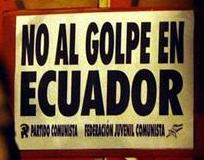 According to President Correa,
these organizations are
acting politically to promote social unrest and opposition
towards his government's policies. In 2012, Correa threatened to
kick out USAID after accusing it of financing opposition
groups and involving itself in the country's internal
politics.
According to President Correa,
these organizations are
acting politically to promote social unrest and opposition
towards his government's policies. In 2012, Correa threatened to
kick out USAID after accusing it of financing opposition
groups and involving itself in the country's internal
politics.
He said other progressive governments were analyzing whether or not to take the same actions.
Some reports also indicated that President Rafael Correa could be targeted by the CIA, given his strong opposition to U.S. intervention in the country and region. Since taking office, he has closed a U.S. military base in Manta and expelled two U.S. diplomats who worked for the CIA. He has also given asylum in the Ecuadorean embassy in London to Julian Assange.
As it did 50 years ago, the CIA continues to intervene and infiltrate through new methods and new assets in Ecuador.
(June 5, 2016)
Honduras
More than 1,000 Students Murdered in
Aftermath of Coup
At least 1,183 Honduran students have been murdered in Honduras in the last six years, the Observatory of the Violence of the National Autonomous University of Honduras (OV-UNAH) reported on June 17.
Most of the students were killed during robberies carried out by gangs, said OV-UNAH coordinator Migdonia Ayestas.
Most recently, at the beginning of June three students were killed in Comayagüela, and two died in armed attacks perpetrated by unknown criminal elements.
The period of time studied by OV-UNAH roughly corresponds to the period following the U.S.-backed coup that removed democratically-elected President Manuel Zelaya on June 28, 2009.
The Intercept, in an April 12 item on the reemergence of government death squads in Honduras, points out, "The coup was accompanied by a huge rise in political violence. By 2012, state security forces had assassinated more than 300 people and 34 members of the opposition and 13 journalists had disappeared, according to data compiled by Honduran human rights organizations. The political assassinations added to the emboldened violence from gangs and drug traffickers, making Honduras one of the most dangerous countries in the world. In 2012, Reuters reported that it had the highest murder rate of any country.
"Although the murder rate has since declined, political violence in Honduras has continued. Since the end of 2012, at least 22 prominent environmental activists have been killed, according to Global Witness."
Successive post-coup neo-liberal governments in
Honduras have opened up the natural resources of the country to
foreign plunder, which the people vigorously oppose. This
resistance is met with violent repression and many have been killed
defending their rights, like Indigenous
anti-mining activist Berta Cáceres who was murdered in March of
this year.
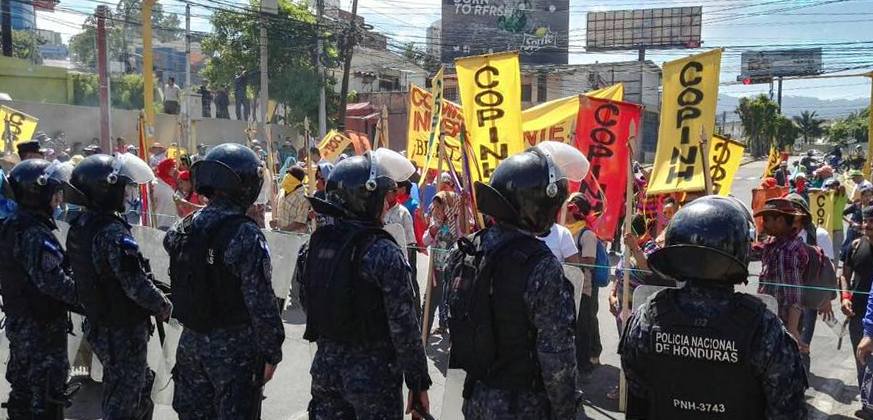
Police presence at day of action in Tegucigalpa, Honduras demanding
justice in the killing of Indigenous rights activist Berta
Cáceres.
(Prensa Latina, The Intercept. Photo: JASS Mesoamerica)
Global Day of Action Demands Justice in Killing of Indigenous Rights Activist
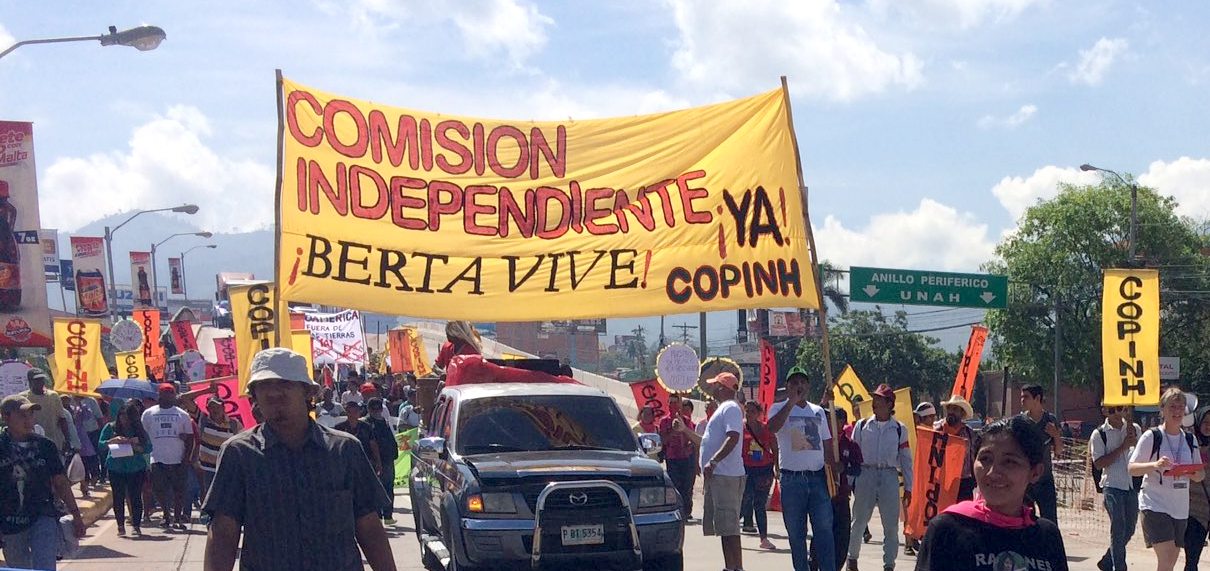
Tegucigalpa, Honduras
On June 15, people around the world held protests outside Honduran embassies and consulates to demand justice for murdered Indigenous leader Berta Cáceres and a "stop to death, impunity, and injustice" in that country.
The global day of action was spearheaded by the Civic Council of Popular and Indigenous Movements of Honduras (COPINH), which Cáceres cofounded over two decades ago to defend Lenca land, natural resources and sovereignty. COPINH has called for international support for two key demands to ramp up pressure on Honduran authorities to take urgent action on the human and Indigenous rights crisis.
The first demand is to reiterate the call for an independent, international team of experts -- led by the Inter-American Commission on Human Rights -- to immediately get involved in the Cáceres case to ensure an impartial and thorough investigation of this crime. Honduran authorities have not heeded this call and are excluding Cáceres' family and colleagues from the investigation.
The second demand is for the "immediate and definitive cancellation" of the Agua Zarca dam project, which is being built without the consent of the local Lenca community in Rio Blanco. Cáceres reported dozens of death threats and other harassment in the years prior to her murder, including from agents allegedly linked to the company behind the dam, the private Honduran energy firm Desarrollos Energeticos SA, better known as DESA.
COPINH leader Tomás Gómez, who has filled Cáceres' vital role in the organization, was in Washington, DC, to join the local rally and pressure Congress to suspend security aid to Honduras in order to stop its complicity in the country's systematic and deadly human rights abuses.
Gómez recently told TeleSUR that the harassment and threats against COPINH and the Lenca community in Rio Blanco have increased since Cáceres' assassination on March 3.


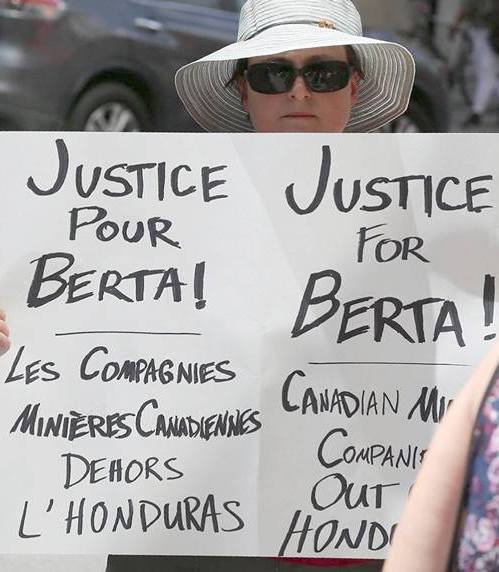
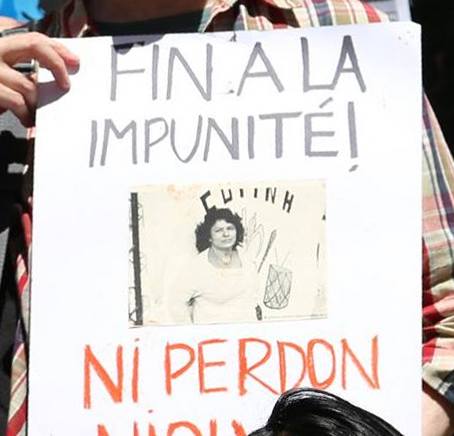
Montreal, Quebec

Ottawa, Canada
 Washington, DC, USA
Washington, DC, USA

Chiapas, Mexico
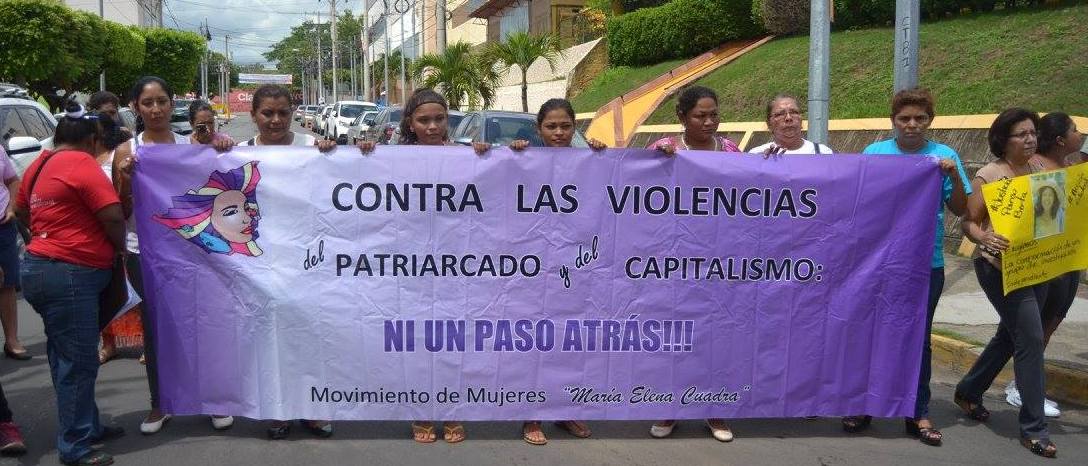
Managua, Nicaragua
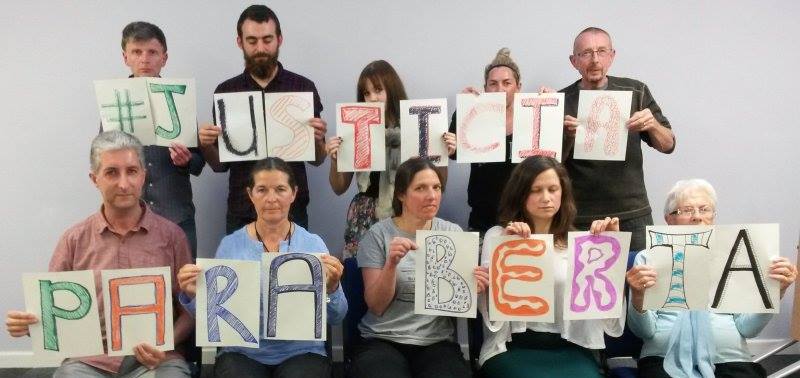 Manchester, UK
Manchester, UK
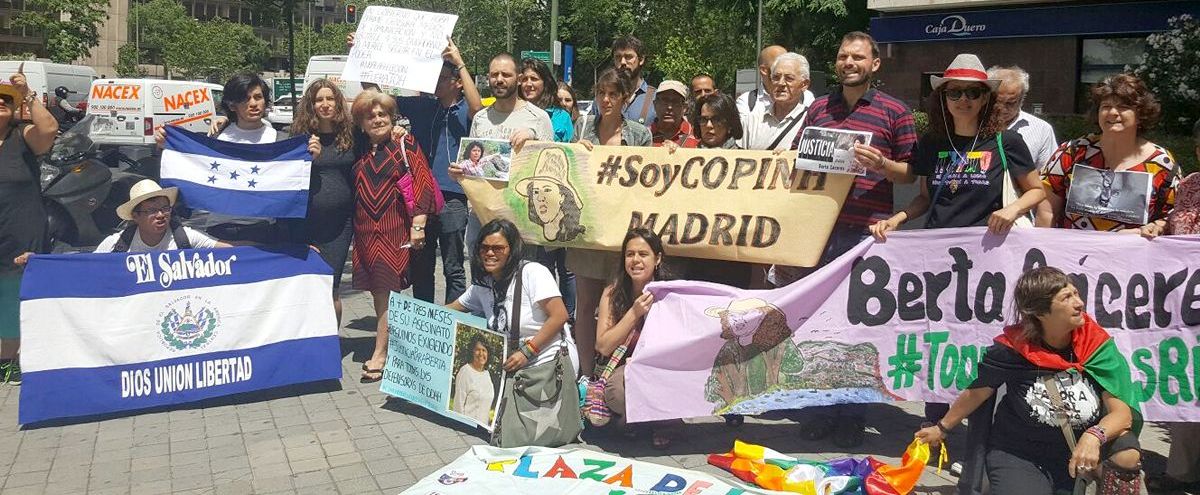 Madrid, Spain
Madrid, Spain
(Photos: COPINH, Comité pour les droits humains en Amerique Latine, Inter Pares, Movimiento Feminista, Comunidad de Catrachos, Witness for Peace.)
Cuba
Debate on Cuba's Future Underway
As agreements are made to be fulfilled and not to be shelved, today one of the decisions of the recent 7th Party Congress -- which was outlined on the very first day [April 18] in the Central Report -- is already being put into practice: "In order to enrich and perfect these documents we propose that both, that is to say, the conceptualization and fundamentals of the National Development Plan, after being reviewed by the Congress, be submitted to a process of democratic discussions by members of the Party and Young Communist League, representatives of mass organizations and broad sectors of Cuban society."
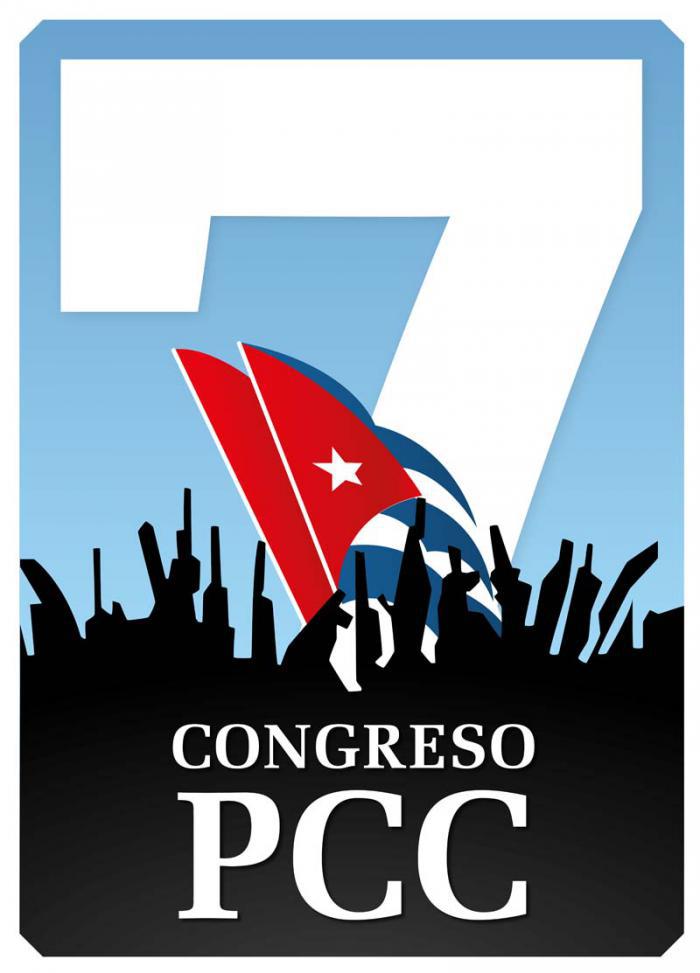 That day, the Party First
Secretary, Army General
Raúl Castro
Ruz, also added: "Thus we request that the Congress grant the
Central Committee the authority to make any necessary
modifications that may result from the consultation process,
including relevant adjustments to guidelines that might be
approved during this event, as well as final approval of the
documents."
That day, the Party First
Secretary, Army General
Raúl Castro
Ruz, also added: "Thus we request that the Congress grant the
Central Committee the authority to make any necessary
modifications that may result from the consultation process,
including relevant adjustments to guidelines that might be
approved during this event, as well as final approval of the
documents."
This is a highly significant agreement, embodying the national vision proposed by the model, whose conceptual substance is based on a sovereign, independent, socialist, democratic, prosperous and sustainable society. That is, the Party of the nation, a single party, but with a deeply democratic character, submitting both texts to the people in order to crystallize a participatory project par excellence.
It has been said, and rightly so, that these are comprehensive and highly complex documents, which need to be read and analyzed more than once, to ensure a proactive and purposeful debate. A logical route to a better understanding of the texts is to begin by thoroughly studying the Central Report to the 7th Congress, which provides the reasoning. As for the two texts subject to consultation, the Draft Conceptualization of the Cuban Economic and Social Model should be studied first, to understand the proposal as to what we want to achieve, followed by the fundamentals of the National Economic and Social Development Plan through 2030, in order to consider how to achieve the country we desire, once the economic and social model has been updated.
The Conceptualization presents the main transformations that characterize these new fundamentals, that is, what needs to change in order to advance and consolidate the unchanging principles of our socialism, and build a nation with the described attributes. It is written in the present tense, it expresses what we want to be, and also outlines the principles underlying the model: social ownership of the means of production; a planned economy and social policies.
The National Development Plan through 2030 defines the strategic concepts (effective socialist government and social integration, productive transformation and international integration, infrastructure, human potential, science, technology and innovation, natural resources and the environment, and human development, justice and equity), which form the driving forces of the plan and will enable its materialization and the attainment of the society we want. It covers all areas of society, and includes economic sectors which are equally strategic (construction, electro-energy, telecommunications, transport, storage and trade, tourism, professional services, agribusiness and the food industry, pharmaceuticals, biotechnology and biomedical products, the sugar industry and its derivatives, and light industry), whose performance will direct the rest of the economy, creating a climate of productive efficiency at a national level.
But, take note, this is not a purely economic debate, and the Central Report itself says so, "The economy continues to be the key unresolved task and political-ideological work is a permanent issue, intimately linked with the economic battle, as it ensures the conscious, active and committed participation of the majority of the population in the process of updating the economic and social model."
What has begun to happen this June 15 will lead to Cubans defining and participating in their future. Doing so as a right, ratifying the sovereign, independent nature of the nation. This is not a new procedure. It strengthens the humanist essence of a Revolution which upon reaching 58 years since its inception, does not consider its work complete, a Revolution which seeks to improve quality of life, not only for the collective, but in terms of family and personal projects.
This is a proposal for a socialist nation, in which it is again reiterated that no one will be left to their own fate, unprotected. We return to the Central Report to read, "Decisions made with regard to the Cuban economy will never, under any circumstance, mean a break with the ideals of equality and social justice of the Revolution and much less rupture the strong union between the majority of the people and the Party. Neither will we allow such measures to generate instability or uncertainty within the Cuban population." This principle has a clear implication: No one is unnecessary in socialism, at least in the socialism being constructed in Cuba.
Everyone counts, just as the opinions to be gathered count, on the Conceptualization and Development Plan, which are not bureaucratic texts, but documents which have been crafted and revised by academics, specialists, economists and intellectuals -- eight different versions in the case of the Conceptualization.
We also know that two Central Committee plenums (December 2015 and January 2016) contributed 900 suggestions, which led to yet another draft, [that was] then submitted to 1,000 Congress delegates and more than 3,500 invitees, including all National Assembly deputies, who submitted more than 8,800 comments and proposals which were incorporated to produce the version presented at the 7th Congress, where the document was again modified.
A stage of vital importance has now arrived. What emerges from this great discussion will go to the Central Committee meeting next December for approval, and then to the National Assembly of People's Power, and produce improved documents. When the National Assembly takes them to a vote, they will no longer be 7th Congress texts, but those which describe the country we want.
They will serve us in the decisive debate to which compañero Raúl called us during the 6th Congress: "Without the slightest chauvinist intention, I believe that Cuba is among a small number of countries in the world with the conditions in place to transform its economic model, and emerge from the crisis without social trauma, because, in the first place, we have a patriotic people, which knows it is powerful because of the strength represented by its monolithic unity, the justice of its cause, and its military preparedness, highly educated and proud of its history and revolutionary roots."
(Granma, June 15, 2016)
40th Anniversary of the Soweto Uprising
Signal Contribution of the Courageous
South African Students
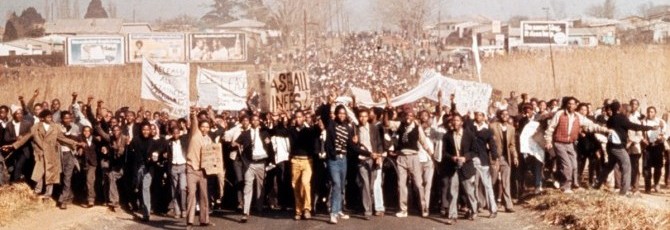

On June 16th, 1976 in the African township of Soweto, on the outskirts of Johannesburg, apartheid South African police massacred 176 Black students, and wounded more than 700. The Soweto uprising remains to this day the signal contribution of the infinitely courageous South African students' movement for justice and social transformation everywhere.
The heroic martyrs of Soweto were part of 20,000 students who marched that day to protest the imposition of Afrikaans as mandatory for school instruction for most of the subjects in elementary and secondary school. Afrikaans, a language derived from Dutch, was the language of the ruling elite. Thus, the racist state was inflicting the oppressor's language on Black youth. African languages were denigrated, restricted to the subjects of religion, music and social lessons. Under the Bantu Education Act, the education that Africans received was designed to keep them as a source of cheap labour; the compulsory introduction of Afrikaans further deepened the disenfranchisement of Black South Africans. While the immediate impetus for the demonstration was the imposition of Afrikaans, students were fighting for the broader cause of self-determination.
|
|
Black youth organized to oppose the racist diktat. On April 30, students at Soweto's Orlando West Junior School in Soweto refused to attend class. This profound act of defiance inspired the student bodies of other schools. On June 13, the Soweto Students' Representative Council was formed, which called for a June 16 mass rally at the Orlando Soccer Stadium. On June 16, thousands of unarmed students marched singing freedom songs and carrying signs declaring, for example, "Down with Afrikaans!"; "Bantu Education -- to Hell with It!"; "If We Must Do Afrikaans, Vorster must do Zulu"; and "Viva Azania!" As they marched to the stadium, the apartheid state's police blocked the route. With the youth refusing to yield, the police attacked them with teargas and dogs. Unable to break the resistance, police then fired directly into the massed students. Thirteen-year-old Hector Pieterson was the first student killed. The photograph of 18-year-old Mbuyisa Makhubo carrying Hector's body, as Hector's sister 17-year-old Antoinette runs next to them, is the iconic image of the massacre. As noted, Hector Pieterson died along with another 175 students, with more than 700 wounded. The hospitals were overwhelmed by the number of casualties. However, despite the brutality that was unleashed, the students fought back against the terror of the apartheid state. Soweto sparked a countrywide rebellion. In the subsequent weeks hundreds of youth were killed by the racist state.
The Soweto Uprising and other Black rebellions that followed in Soweto's wake created an unprecedented crisis for the racist regime, signaling the collapse of the South African government's ability to confine black politics within the limits defined and permitted by apartheid. The uprising was a watershed, heralding, as historian Saul Dubow wrote, "the demise of white supremacy and made real the possibility of liberation, perhaps for the first time... An unquenchable spirit of rebellion was becoming manifest..." Soweto ushered in the era of the ungovernability of the townships and black militancy; it was one of the most significant chronological markers in the struggle against and eventual demise of apartheid.
Soweto and Southern African Liberation Struggles
The Soweto Uprising was part and parcel of the wave of
anti-colonial and national liberation struggles that swept
southern Africa in the 1970s. The internal struggle within South
Africa was dialectically linked to the struggles waged in the region.
Angolan and Mozambican
liberation pushed the anti-colonial movement onto South Africa's
frontiers. Mozambican independence and the defeat of the racist
South African armed forces in Angola had an important role in
amplifying militancy among Black youth. Allister Sparks, a
reporter and editor of the Rand
Daily Mail, observed: "The
slogans and rhetoric of the Portuguese colonial revolution swept
the South African townships and stimulated a nascent rise in
revolutionary consciousness."
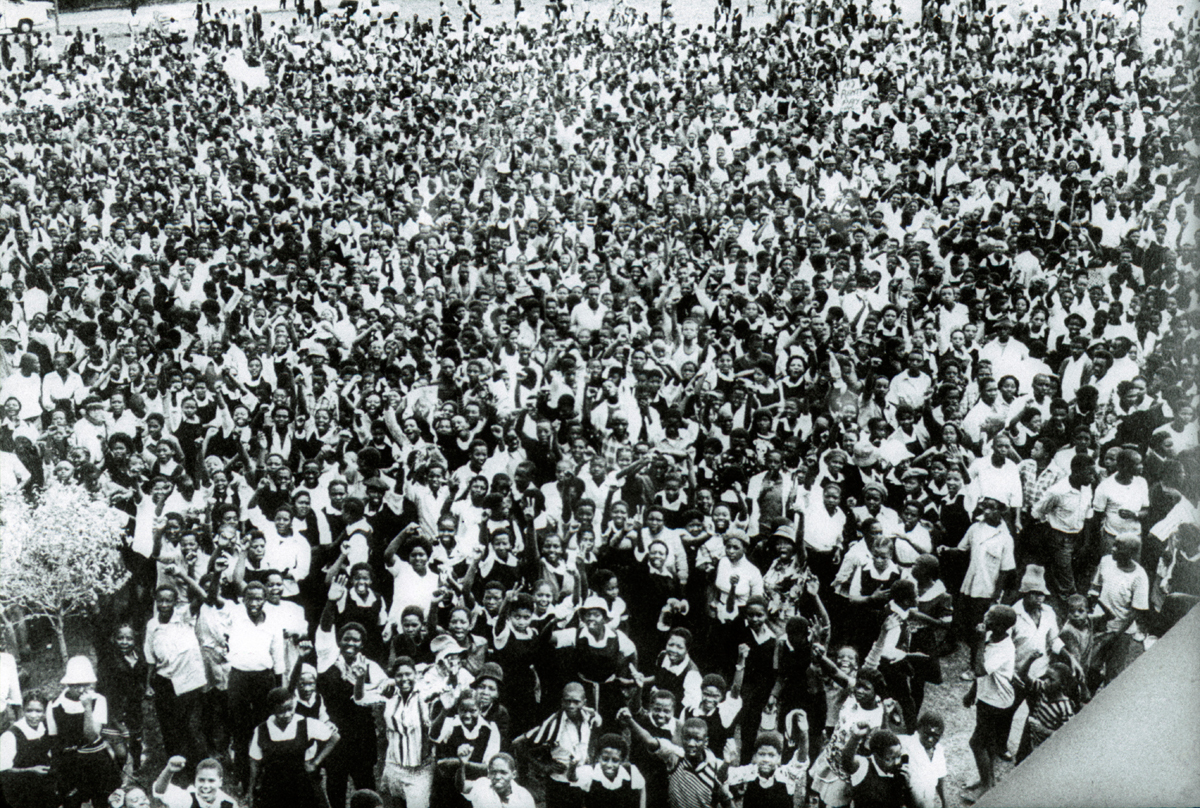
Of particular significance was the defeat of South African armed forces in Angola in 1975-76 by Angolan and Cuban troops. The impact of South Africa's defeat extended to the Soweto Uprising. A principal of a Soweto high school provided compelling testimony, stating that the situation in Angola "was very much on the minds of his 700 students... They discuss it all the time and they are pleased by the developments there -- it gives them hope." The London Sunday Times observed that Cape Town's 'coloured' townships gangs were adopting new names such as "Cuban Kids" and "MPLA Terrors." Perhaps, the most poignant illustration of this influence was a placard used during the Soweto march. It simply stated: "It happened in Angola. Why not here??"
Nelson Mandela, in a message smuggled out of Robben Island, stated "[T]he frontiers of white supremacy are shrinking. Mozambique and Angola are free and the war of liberation gathers force in Namibia and Zimbabwe." The South African Communist Party declared, "Whilst Angola destroyed the myth of the South African military invincibility, Soweto demolished the myth that the government's security forces are able to destroy the people's revolutionary spirit." Oliver Tambo, then President of the African National Congress, unequivocally linked Angola and the Soweto Uprising:
"Terrified at the prospect of the victory of the forces of progress within the country in the aftermath and as a direct continuation of the popular victory in Angola, the Vorster regime, unleashed the bloody terror that is today symbolized by Soweto."
Regional developments had a radicalizing effect on Black South African youth, playing a significant role in re-igniting the anti-apartheid struggle within South Africa. The uninterrupted frontal challenge to apartheid -- both within and without South Africa -- signalled the collapse of Pretorian regional hegemony. Consequently, the apartheid regime's existence and survival now rested in the first and final instance of state violence and repression; its domination was primarily exercised through the militarization of the state, townships and the region.
Crimes of the Cold War
Remember the Rosenbergs, Murdered by the U.S. Ruling Circles 63 Years Ago
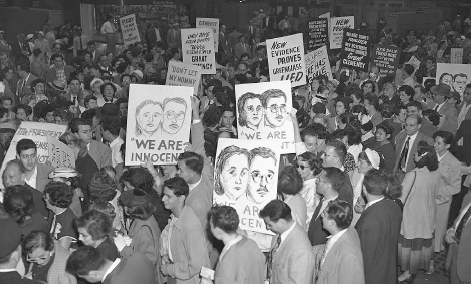
On June 19, 1953, U.S. citizens Julius and Ethel Rosenberg were executed at Sing Sing Prison in New York on the false charge of conspiring to pass atomic secrets to the Soviet Union during the Second World War. The U.S. and Soviet Union were nominally allies against Nazi Germany at the time so the Rosenbergs were actually sentenced to death for passing secrets to a U.S. ally, which makes no sense. But the U.S. was a Soviet ally in name only. It is now well-known that the U.S. ruling circles, which had conspired with Nazi Germany during the war, had decided to openly betray the anti-fascist alliance before the war ended and to rebuild Germany as an anti-communist bulwark against the Soviet Union.
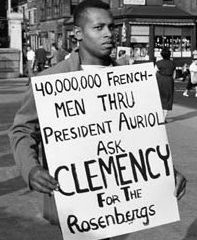 No documentary proof of
spying by the Rosenbergs was
produced
during the trial and allegations by "witnesses" went
uncorroborated. The single scrap of physical evidence produced
was a supposed sketch of the high-explosive lens mold that U.S.
scientists were developing at the Los Alamos atomic weapons
research centre.[1]
It was
supplied by Ethel Rosenberg's brother, David Greenglass, a Los
Alamos army machinist who later confessed he accused Ethel Rosenberg
of spying only to save his own wife from prison. Dr. Henry
Linschitz, a Los Alamos chemist involved with development of the
lens mold, said in an affidavit endorsed by fellow scientists
Robert Oppenheimer and Harold Urey that the sketches were "too
incomplete, ambiguous and even incorrect to be of any service or
value to the Russians in shortening the time required to develop
their nuclear bombs." In a March 1997 article, Alexandr Feklisov,
a former KGB agent who had met with Julius Rosenberg between 1943
and 1946, stated in the New York
Times: "He [Rosenberg] didn't
understand anything about the atomic bomb, and he couldn't help
us."
No documentary proof of
spying by the Rosenbergs was
produced
during the trial and allegations by "witnesses" went
uncorroborated. The single scrap of physical evidence produced
was a supposed sketch of the high-explosive lens mold that U.S.
scientists were developing at the Los Alamos atomic weapons
research centre.[1]
It was
supplied by Ethel Rosenberg's brother, David Greenglass, a Los
Alamos army machinist who later confessed he accused Ethel Rosenberg
of spying only to save his own wife from prison. Dr. Henry
Linschitz, a Los Alamos chemist involved with development of the
lens mold, said in an affidavit endorsed by fellow scientists
Robert Oppenheimer and Harold Urey that the sketches were "too
incomplete, ambiguous and even incorrect to be of any service or
value to the Russians in shortening the time required to develop
their nuclear bombs." In a March 1997 article, Alexandr Feklisov,
a former KGB agent who had met with Julius Rosenberg between 1943
and 1946, stated in the New York
Times: "He [Rosenberg] didn't
understand anything about the atomic bomb, and he couldn't help
us."
The use of the lens mold "evidence" also falsely suggested that there was such a thing as a secret which was critical to creation of the atomic bomb. The fact was that at the end of the Second World War, U.S. atomic scientists had emphasized over and over that there was no secret to the bomb. In fact, in 1945 the U.S. government published their official report Atomic Energy Developed for Military Purposes (aka the Smyth Report), which outlined all the basic steps in the U.S.'s atomic bomb project, clearly showing there were no atomic bomb secrets. U.S. scientists had also stated over and over that other countries would be able to apply the same scientific principles and develop their own bomb within three to five years. They added that since it was impossible to develop defenses for atomic warfare, it was mandatory to establish conditions under which world cooperation in atomic power would prevail. In his infamous Cold War-opening "Iron Curtain" speech in Fulton, Missouri in 1946, former British Prime Minister Winston Churchill raved that nuclear cooperation was "criminal madness."
The Rosenbergs, who were both members of the Communist Party USA, were the first and only U.S. citizens to be publicly executed for espionage. Ethel Rosenberg was the first woman to be executed by a federal order. Their trial and execution took place at the height of the Cold War, when open anti-communism and hatred of the Soviet Union was the U.S. state ideology, the McCarthyites were running rampant with their witch hunts, and anyone with progressive views was persecuted unmercifully. It was clear from the beginning that the Rosenbergs were really on trial for their political views and to try to intimidate others. The trial judge told the court that he believed the Rosenbergs' spying had "caused the Communist aggression in Korea." The U.S. government promised the couple leniency if they would publicly attack the Soviet Union but they refused and stood on their principles to the end. In his last letter, Julius Rosenberg accurately stated that he and Ethel were "victims of American fascism."
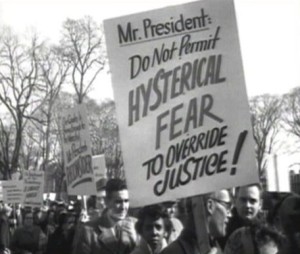 U.S. President Dwight
Eisenhower was forced right after
the
execution to make a public statement that was a ludicrous attempt
to justify the state-ordered murders. Eisenhower used Nazi
Minister of Propaganda Joseph Goebbels "Big Lie" technique,
claiming: "By immeasurably increasing the chances of atomic war,
the Rosenbergs may have condemned to death tens of millions of
innocent people all over the world. The execution of two human
beings is a grave matter. But even graver is the thought of
millions of dead, whose deaths may be directly attributable to
what these spies have done." As is well known, the only country
which has ever used atomic bombs to kill innocent people is the
United States, which in 1945 had dropped atomic bombs on the Japanese
cities of Hiroshima and Nagasaki, acts of state terrorism which
caused, directly and indirectly, hundreds of thousands of
deaths.
U.S. President Dwight
Eisenhower was forced right after
the
execution to make a public statement that was a ludicrous attempt
to justify the state-ordered murders. Eisenhower used Nazi
Minister of Propaganda Joseph Goebbels "Big Lie" technique,
claiming: "By immeasurably increasing the chances of atomic war,
the Rosenbergs may have condemned to death tens of millions of
innocent people all over the world. The execution of two human
beings is a grave matter. But even graver is the thought of
millions of dead, whose deaths may be directly attributable to
what these spies have done." As is well known, the only country
which has ever used atomic bombs to kill innocent people is the
United States, which in 1945 had dropped atomic bombs on the Japanese
cities of Hiroshima and Nagasaki, acts of state terrorism which
caused, directly and indirectly, hundreds of thousands of
deaths.
Exposure of the lies about atomic secrets means that even the overall claim that any "Soviet spies" ever obtained any information anywhere which helped the Soviet Union develop the atomic bomb is highly questionable.[2] In fact, the roots of the Soviets' own Bomb Project went far back to 1910 with research into radioactive materials. The Soviets launched their atomic bomb program in September 1942, after it became very clear that the U.S. and others were already building a bomb, as demonstrated by evidence contained in the 1940 report of the British committee struck to determine how to build a nuclear bomb, codenamed the MAUD Committee. Work on the Soviet program accelerated after the U.S. Trinity bomb test on July 16, 1945. On December 25, 1946, the Soviets created their first chain reaction in a graphite structure. The Soviet Union exploded its first atomic bomb on August 29, 1949, only four years after Nagasaki. It should also be noted that Soviet atomic scientists were burdened by having to work under the onslaught of the Hitlerite invasion while U.S. scientists worked in peaceful circumstances.
The Rosenbergs were sentenced to death on April 5, 1951, but the conviction was followed by four years of appeals, protests, and a world-wide campaign for clemency that included such people as physicist Albert Einstein. On the day of the execution, 5,000 protesters rallied at Union Square in New York City and hundreds of supporters picketed the White House. Large protests took place world-wide, including in Paris where 400 people were arrested, in London, and in Rome. Ten thousand people attended the funeral in Brooklyn. Many older Americans trace the moment of their "radicalization" to the Rosenberg executions. The campaign to exonerate the Rosenbergs has continued to this day, spearheaded by their children, Michael and Robert Meeropol, and their granddaughter, film director Ivy Meeropol, who in 2004 produced the reflective film, Heir to an Execution. On September 20, 2015, New York City Council honoured Ethel Rosenberg on what would have been her 100th birthday, acknowledging her unjust execution. A monument to the memory of the Rosenbergs stands in Havana, Cuba. The Spanish text reads: "For peace bread and roses we will face the executioner. Ethel and Julius Rosenberg. Murdered June 19, 1953."
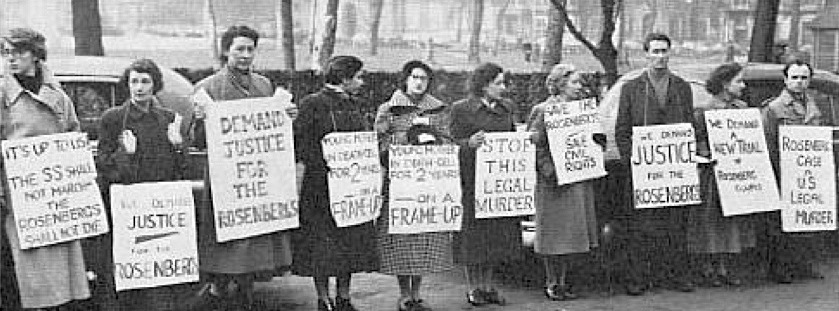
Notes<
1. Canada secretly supplied much of the uranium for the U.S. atomic bomb project from its government-owned Eldorado Mines at Port Radium on the shores of Great Bear Lake, Northwest Territories. Sahtu Dene people were employed at minuscule wages to carry dangerous radioactive ore on their backs, with no protection. The Canadian government knew of the radiation dangers but hid them. The Sahtu Dene now suffer from very high cancer rates.
2. The first atom spy scare took place in Canada starting February 15, 1946, based on stories told by cipher clerk, Igor Gouzenko. Montreal MP Fred Rose, a member of the Communist Party, and many others were arrested under the Official Secrets Act. Many were released but Rose was sent to prison for four-and-a-half years. Author William Reuben argues convincingly in his exhaustive book, The Atom Spy Hoax (Action Books, 1954), that such a spy network never existed but was concocted by the Canadian state to suppress dissent.
Website: www.cpcml.ca Email: editor@cpcml.ca
